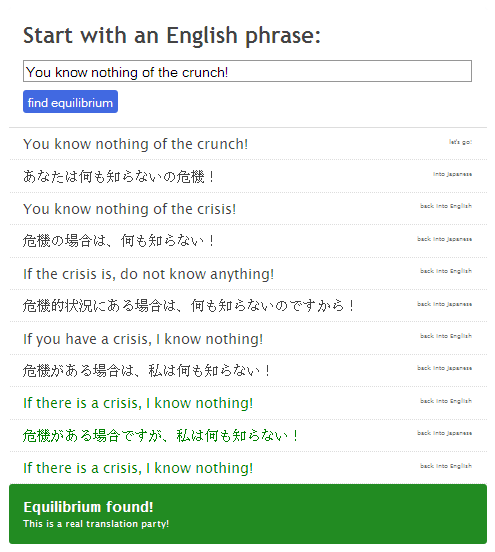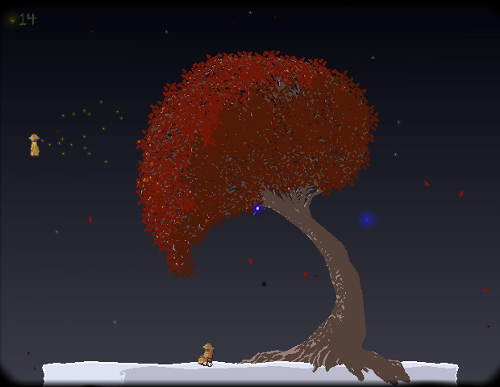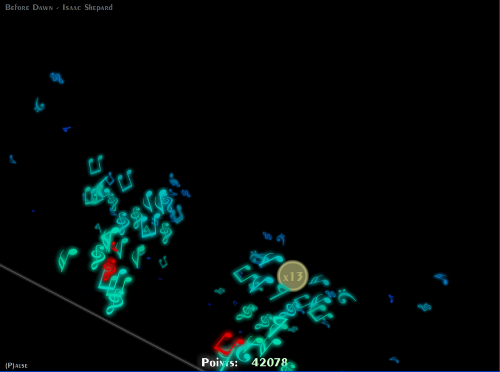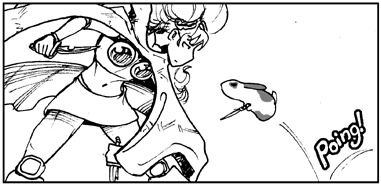Some things are just so awesome that they much be blogged, even if I can add nothing to them:
Translation Party.
Gaming Renaissance
Lately, as a consequence of following Boingboing, I have been catching their periodic round-ups from their gaming-centric spin-off site, Offworld. As a consequence, I have observed what seems to me like a wonderful thing: a renaissance in classic gaming!
Two free games in particular have struck me recently with their sheer mind-blowing awesomeness, so much so that I am compelled to blog about them: Glum Buster and Music Catch.
Glum Buster
Justin ‘CosMind’ Leingang’s Glum Buster is random. I would not be the first to say so, if I said that the alien, unexplained sideways-scrolling nature of the beast strongly reminds me of the classic Another World. That said, this is nothing like Another World…
Glum Buster seems to revolve around the life on an anonymous little guy in what looks like a little yellow raincoat. One day this guy steps out his door and meets (spawns?) his evil doppelganger, who proceeds to suck him into a series of alternate/alien dimensions, where things are frickin’ strange!
The game is at pains to give you the minimum possible advice about how the controls work, and absolutely none about what they’re for. That part is a matter of exploration, changing anew with each little level. Occasionally, it seems as if a sequence of levels is progressing along some pattern, in terms of how each stage works, but then it will throw you again as it convolves in some previously unthinkable axis.
Beautiful and gentle, I can’t help thinking as I play that this game is what Hayao Miyazaki would have made if he were a hobbyist programmer, and not an animator.
Music Catch
Reflexive’s Music Catch 2 is a flash game with a non-free downloadable counterpart and, I gather, an iPhone port. It’s addictive, but without that arm-scratching, crack-addiction dementia that one tends to get from PopCap games.
It’s a concept alomst too simple to describe: wave your mouse pointer around. Collect as many as possible of the (numerous) blue things, and especially the yellow things, while avoiding the red things. Purple things provide a temporary ‘vacuum’ effect which only sucks up good stuff.
While complete, that description overlooks nearly everything that’s good or original about the game. In particular, it overlooks the feel, and it overlooks the music.
Music is central to the game: The things one collects or avoids are generated with a rate and distribution governed by the music. The downloadable game doesn’t have levels, it has tracks, and it will let you create your own new levels without limit… by selecting your own MP3s.
The resulting feel, with the thing-generating surface slowly revolving around the field of play, is hypnotic and serene, even when the music and the pace of the game are respectively driving and hectic.
Music Catch ably maximises the oldest heuristic for the quality of a game: It is very very easy to play, and very, very hard to master.
Homework
E just sent me the most wonderful article about the pros and cons of working from home.

It strikes me that the dilemmas described in it are terribly important to my next big career decision, so I need to address them honestly, directly.
One way to ensure this, methinks, is to blog about it: The article defines an eight point checklist, which I will try to respond to point-by-point. Continue reading
Honestly, who cares?
Just this morning, I was powerfully struck by the usefulness of the following phrase:
I don’t care enough to do anything about it.
At first glance, this may sound callous. Let me explain…
When one reads (watches, listens to) the news (especially world news), it is rare to find anything one can actually do anything about directly. Moreover, there will always be a majority of items in any batch of daily news about which one is hard-pressed to even invest much attention, enthusiasm, or emotion of any kind. We each have a limited range of things we can care deeply about, and an even more limited range of things we can actually effect.
In my experience, this leads to a kind of guilty anxiety. Take, for example, with the news that the Chinese government are crushing the Uighur in Xinjiang, essentially for being different. I must have seen several dozen articles on this recently, without ever once having sought them out. There really isn’t anything I can realistically do about it: I’m one busy Australian system administrator, and the Chinese government are notoriously impervious to foreign (or even local) opinion, sanctions, or even threats. Besides, this is one of a hundred horrible things I hear about in the world every day. Even were I Superman or head of the United Nations, I would still have to prioritise.
I feel somewhat inclined, when I read about Xinjiang for the eleventy zillionth time, to say “I don’t care”, but I don’t because it feels untrue. I do care, just not enough. That’s not a damning confession, it’s the unashamed truth: I don’t care enough to do anything about it. How much would I need to care in order to do something genuinely useful about it? In this particular case, it would need to be a lot. For starters, I would need to care enough to research the problem: What kinds of forces might move the government of China? How might I come to posess (or contribute to) such a force? Who cares? I do, but I don’t care enough to do anything about it!
The phrase isn’t just honest, it’s immensely reassuring:
- “I don’t care enough…” – This implies that I do in fact care.
- “…to do anything about it” – A statement of plan! When I reassess my to-do list fifteen times today, there is one more thing (the plight of the Uighur in Xinjiang) which I will not need to take into consideration.
The latter item is the most important part: The outcome of any given conversation or activity in my day is all too likely to be one or more things I need to do, or worse: one or more things I need to take into consideration when working out what to do. As such, any activity which concludes with a whole category of things I definitely won’t do is a massive win.
An inevtiable part of choosing one’s battles is choosing when not to fight. That choice must not involve guilt, rather we should celebrate it: It means more time to fight the ones we can win.
Today’s idle rambling was brought to you by a long thoughtful walk to the train, a lack of inhibitions about talking to myself in public, and the joyful return of caffiene to my life.
Bad Naming Ideas
Some notes on names for children:
- Alliterative first and last names are bad. Larry Lawler will know no school-yard peace.
- Rhyming first and last names are worse. Gary Parry had better find an awesome nickname, and sell it hard.
- Australian girls should not be named Dianne or Dianna, unless their parents want every social encounter in their children’s lives to begin with an exhoration to “Die!”. (“Hey Die! are you free this Saturday night?”)
- Family planning: A boy who may be an only child should never be called “Bob”. It would be a terrible shame for “Bob” to never be anyone’s uncle.
Google Shock
“Google Shock” denotes the state of stunned disorientation which arises when an unexpected new Killer App crops up with the likely potential to dramatically alter some aspect of one’s life. Similarity to “Culture Shock” is intentional; Google Shock is a form of temporal culture shock.
For example: Google Maps Real Estate.

In my youth, I spent great scads of time cycling or driving about the suburbs within a few kilometers of Monash University (Clayton) clutching a thick wad of liberally annotated rental lists which I had gathered by hand from the many faintly dodgy little real-estate agencies which cater to the student-housing market in that area.
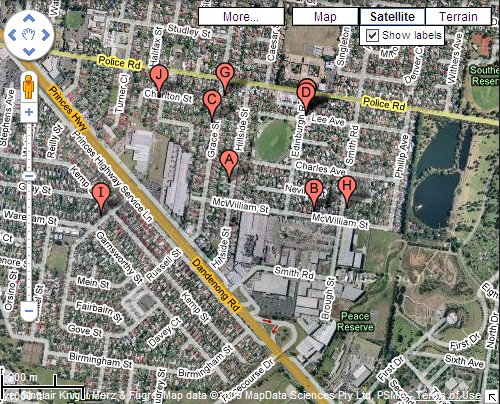
Now, I am in Google Shock. Once again, I find that something I just accepted as a fact of life has been expertly hoovered up into the web.
The rammifications of this are only just beginning to dawn on me…
We are all just a web comic
Well, some of us.
If you don’t like LoTR (or even recognise the acronym (SHAME!)) and/or you don’t roleplay, you may find this webcomic mildly (or less) amusing.
If you, like me, do these things compulsively, you will probably, like me, find that you’re in the freaking comic!
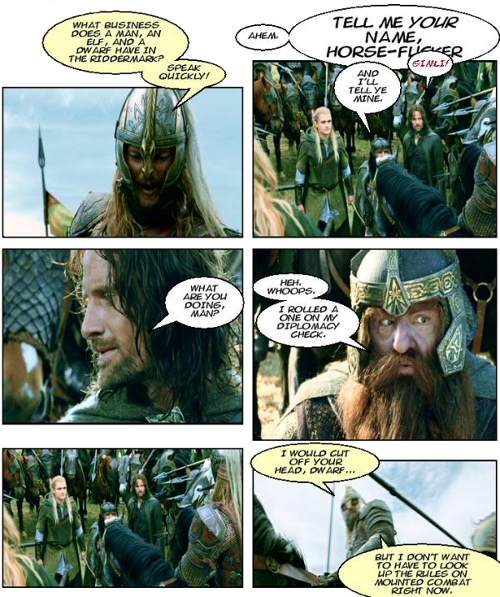
Seriously, I’m only part way through it, and it’s fantastic: I LOL helplessly at least once at nearly every strip. Not only is it chock-full of disturbingly true portrayals of roleplayers (and roleplaying games) being foolish, it also features some completely marvellous hand-picked frames from the Peter Jackson LoTR movies. Who knew that there were so many smug sh*t-eating sneers, smirks and leers to be had form the core characters in those movies? So much gurning too!
References to Star Wars, Monty Python, WoW, Lovecraft and even Nethack abound. It is gloriously nerdy. And the editorial comments! OMG!
I don’t usually post just to spruik a link, but this was simply too good to pass up.
Poing
I haven’t raved about Sluggy for eons, and I’m not going to today.
Just gotta say:
Sluggy Freelance, deeply gratifying readers since 1997
Don’t Panic
A cheerful, and not-at-all anxious or paranoid post, from a Thorne who would never drink too much coffee on a Monday morning…
Don’t Google swine flu. Don’t think about Australia/NZ customs.

Don’t go reading upsetting articles about the likelihood of fresh terrorism.
Don’t look too closely at current economic trends, things must be turning around.
After all, it’s not like economic downturn will have any impact on Peak Oil, or Peak Food.
If you’re reading about Global Warming, don’t read anything that talks about Tipping Points.
Worried about Civil Liberties? Don’t be, this is 2009: We all know better than to foster Police States.
…no links today, because there’s nothing to link to. Move along citizen.
Whatever you do, pay no attention to the sarcasm tag to the right. No! I told you not to do that! Stop it! Stop it at once!
Trouble has moved
trouble.net.au used to live at Serverpronto: a place where it had a whole very crappy PC to itself, and lots of cheap bandwidth. This had a few problems:
- Serverpronto make no pretense at customer service. Don’t try to call them, and don’t expect the bills they charge to make any sense.
- Serverpronto’s policies and price mean their server farms tend to harbour trouble-makers. Some of these people don’t make good neighbours to share a LAN with.
- Serverpronto are based in Florida, which is how they make their bandwidth so cheap. I am based in Australia, conservatively some 200-odd milliseconds away.
- Finally, being in Florida, Serverpronto like their customers to pay in US dollars. Being Australian, I like to pay for things in Australian dollars. The relationship between our dollar and theirs hasn’t been so great lately, and I prefer my budget to be predictable.
So, as of last night, Trouble has moved to a new place: It is now a ‘virtual’ server sharing a big robust physical server with six other virtual servers. The physical server is managed for me by Labyrinth, a Western Australian company who have, so far, displayed completely brilliant levels of customer service.
Along with the move, I have upgraded a bunch of things, and cleaned up a lot of semi-working crap. You’ll notice for example that the gallery is gone. If you have a Trouble account, you will also notice that the available range of admin tools (click “admin” on the main page) has been expanded somewhat.
As always, if anything here is busted, please let me know.
p.s. Yes, I know about that annoying stray grey button in the side-bar. I’m working on it. 🙂

